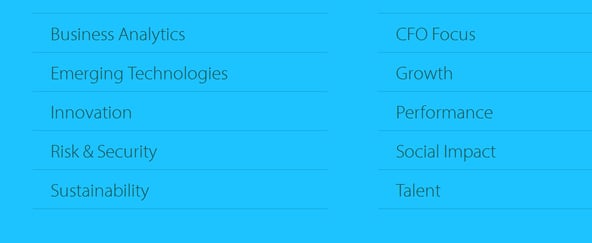 “The world has never been as complex, dynamic and uncertain as it is today and the pace of change will only increase.”
“The world has never been as complex, dynamic and uncertain as it is today and the pace of change will only increase.”We hear this consistently, our continual problem is trying to make sense of it.
One really rich source of knowledge comes from consulting firms.
The emphasis of many consulting practices has been on establishing a clear “thought leadership” approach to underpin the consulting expertise. As this is being published in more open ways, it is not just the client that is benefiting from this research or learning but the wider community.
“Deloitte is helping clients with their most complex challenges – how to grow globally; how to innovate; how to integrate technology and strategy; how to attract, develop and retain talent – so they can make bold decisions with confidence.” I’d buy that so far on their quality of thought leadership.

- Business Analytics covers Data Science and Analytics. It tackles artificial intelligence and cognitive analysis. It looks at connected learning and the network approach. One good link to explore is Digital Education 2.0: from content to connections.
- Emerging Technologies discusses Why strategy, not technology, drives digital transformation and also explores the value of smart devices, IoT and amplified intelligence. It covers the topic of crowdsourcing, crowdfunding and cloud solutions to scale quickly due to diminishing barriers occurring in our business world. Also trend sensing, ecosystems, experimentation and edge scaling are covered here, along with expotential organizations looking for disruption.
- Innovation offers articles on “Beyond design thinking”, written by Larry Keeley, co-founder of Doblin, of ten types fame and now part of Deloitte. They also discuss minimum viable transformation, and separately, a really interesting Editorial piece on scale and innovation.
- Risk and Security is a section that covers cyber security, global risks, choices of regulation and different governance models.
- Sustainability spends significant mileage on smart mobility for many options within businesses, industries or regions of the world. It offers different thinking on options and alternatives on this sustainability question.
- CFO focus is mostly about the transitions being undertaken in Executive transitions and offers thoughts around time, talent and relationships, making hard choices and letting go.
- Growth covers a fair amount (at present) on consumer trends, the growth and options to be considered in their different focus industries.
- Performance is hunting for that “superior business performance”, exploring this in the supply chain, value webs and platform management and in business relationships.
- Social Impact looks at health, aging, alternative options, scarcity as a podcast, ‘smart’ options, commuting, ride sharing, transport options.
- Finally Talent, here you have interesting topics like going rogue or connect passion with profession, learning, leadership, engagement, simplification and performance reinventing are nicely covered to stimulate our thinking.
In summary on Deloitte’s investment in thought leadership.
Deloitte offers a diverse range of topics, depth in introducing and discussing these on a website that is modern, attractive to engage and look around, and offers numerous different filter options and sign up options. Of course, we each have our own focal points but there is increasing value in appreciating different aspects of thought leadership in quality and depth of understanding.
Add the Deloitte consulting arms own website that covers human capital, strategy, operations and technology, it really delivers in my opinion, a highly professional impression and selection of good research in depth, ease of navigation to draw you in to find what you are looking for and that all important feeling they can add value to you as a client or researcher.
I rate Deloitte as one of the best in this thought leadership space, many of the other bigger consultancies are real laggards in this, which I feel is a mistake in their client / reputation / marketing mix.
Thought leadership is really a very, very big, growing business.
Measuring its impact is not easy for the classic ROI yet, if you can measure the material read and then passed on; you have achieved something highly significant. The screening for value has been pre-edited so that it’s relevancy to the receiver is personally valued, sent by someone who really knows what concerns them – something even the most targeted mailings can’t achieve.
If those people are in the position to buy, and influence any consulting decision then that is worth millions but more importantly, allows the conversations to be on a mutual platform for deepening the discussions. Do you agree?
For me, it is not just the passing on but the number of yellow markers I am applying to these. That is partly my litmus test of quality, interest and learning. Yes I know, I still need trees.
Thought leadership is important to demonstrate today so clients can help “size and fit” the thinking with their challenges, to learn and adapt their own thinking with fresh knowledge about how the rest of the world is thinking and learning.
******
Publishing note: This blog post was originally written on behalf of Hype and with their permission, I have republished it on my own site with some small adjustments. I recommend you should visit the Hype blog site where they have a range of contributors writing about a wide-ranging mix of ideas and thoughts around innovation, its well worth the visit.
One thought on “Finding knowledge and research to help you learn and adapt”
Comments are closed.